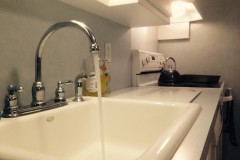A pamphlet that was recently put out warning of exposure to lead from drinking water refers to piping within some of the township’s homes, not the water supply used to supply water.
Drinking water quality monitoring tests conducted by the Brick Township Municipal Utilities Authority over the summer found elevated levels of lead in drinking water in samples from some homes and buildings in Brick that were constructed between 1982 and 1987. The testing was mandated in buildings constructed in that time period, officials say, because household plumbing fixtures and solders during that time contained the substance, which has been linked to a plethora of health issues.
The use of lead in pipes that carry drinking water was banned in 1986 by federal law.
|
|
In September, Brick Shorebeat published the BTMUA’s most recent water quality tests which showed the township’s water supply was significantly cleaner than required by federal law. Substances, including lead, were well below federal limits. In the most recent testing, Brick’s lead level was 0.0005 parts per million, compared to the federal safety limit of 0.015 parts per million.
The testing that the agency was required to carry out in select homes building in the 1980s was done to simulate a scenario that would led to a most-likely case of exposure. During the tests, the water samples were required to sit in the homes’ plumbing for a minimum of 6 hours and were found to absorb small amounts of lead from household plumbing fixtures and solders during that time – not the township’s water supply itself.
Despite the fact that Brick’s water supply is effectively lead-free, the MUA said it has been taking steps to protect those whose homes may have lead soldering of plumbing fixtures.
“In addition to diligently managing water quality, Brick Utilities began adding a commonly used corrosion inhibitor to its water during 2014,” the MUA said in a statement.
The corrosion inhibitor is expected to reduce the potential for lead in household plumbing fixtures to leach into customer water in their homes. Brick Utilities has been working with staff from the state Department of Environmental Protection to “evaluate the performance of the corrosion inhibitor system and secure final permitting for the use of this corrosion inhibitor.”
Protecting From Lead Exposure
While the township’s water supply is safe, those with homes built using lead soldering or plumbing fixtures should take some simple steps to ensure their water does not pick up any lead. Lead can cause damage to the brain and kidneys, and can interfere with the production of red blood cells that carry oxygen to all parts of the body. Children, infants and pregnant women are most at risk for health issues after exposure.
Additionally, scientists have linked the effects of lead on the brain with the lowered IQ in children, and adults with kidney problems and high blood pressure can be affected by low levels of lead more than healthy adults.
According to the MUA, some steps can be taken to reduce the risk, including:
• Run the water to flush out lead. Let the water run from the tap before using it for drinking or cooking any time the water in a faucet has gone unused for more than 6 hours. The longer the water resides in plumbing the more lead it may contain. Flushing the tap means running the cold water faucet for about 1 5- 30 seconds. Although toilet flushing or showering flushes water through a portion of the plumbing system, you still need to flush the water in each faucet before using it for drinking or cooking. Flushing tap water is a simple and inexpensive measure you can take to protect your health. It usually uses less than one gallon of water.
• Use cold water for cooking and preparing baby formula. Do not cook with or drink water from the hot water tap. Hot water can dissolve lead more quickly than cold water. If you need hot water, draw water from the cold tap and then heat it. Do not use water from the hot water tap to make baby formula.
• Do not boil water to remove lead. Boiling water will not reduce lead.
• Look for alternative sources or treatment of water. You may want to consider purchasing bottle d water or a water filter. Be sure the filter is approved to reduce lead or contact NSF International at 1 – 800 – NSF – 8010 or www.nsf.org for information on performance standards for water filters. Be sure to maintain and replace a filter device in accordance with the manufacturer.
• Get your child tested. Contact your local health department or healthcare provider to find out how you can get your child tested for lead if you are concerned about lead exposure. Your family doctor or pediatrician can perform a blood test for lead and provide you with information about the health effects of lead.












